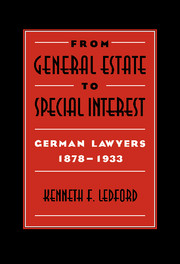Book contents
- Frontmatter
- Contents
- List of Illustrations
- Hierarchy of Courts
- Glossary of Legal and Other Terms
- Abbreviations
- Preface
- 1 The Archimedean Point: Lawyers, Liberalism, and the Middle-Class Project
- 2 Freie Advokatur: The Blending of the Middle-Class and Professional Projects
- 3 Foundation of the Modern Profession: The Private Bar under the Lawyers' Statute
- 4 Institutional Framework: Lawyers and Honoratiorenpolitik
- 5 Growth and Diversification: Lawyers in the Province of Hannover, 1878–1933
- 6 Elites and Professional Ideology: Self-Discipline and Self-Administration by the Anwaltskammer Celle
- 7 Simultaneous Admission: The Limits of Honoratiorenpolitik
- 8 The Limits of Economic Liberalism: Freie Advokatur or Numerus Clausus?
- 9 The Limits of Political Liberalism: Lawyers and the Weimar State
- 10 Conclusion: Lawyers and the Limits of Liberalism
- Methodological Appendix
- Bibliography
- Index
6 - Elites and Professional Ideology: Self-Discipline and Self-Administration by the Anwaltskammer Celle
Published online by Cambridge University Press: 11 September 2009
- Frontmatter
- Contents
- List of Illustrations
- Hierarchy of Courts
- Glossary of Legal and Other Terms
- Abbreviations
- Preface
- 1 The Archimedean Point: Lawyers, Liberalism, and the Middle-Class Project
- 2 Freie Advokatur: The Blending of the Middle-Class and Professional Projects
- 3 Foundation of the Modern Profession: The Private Bar under the Lawyers' Statute
- 4 Institutional Framework: Lawyers and Honoratiorenpolitik
- 5 Growth and Diversification: Lawyers in the Province of Hannover, 1878–1933
- 6 Elites and Professional Ideology: Self-Discipline and Self-Administration by the Anwaltskammer Celle
- 7 Simultaneous Admission: The Limits of Honoratiorenpolitik
- 8 The Limits of Economic Liberalism: Freie Advokatur or Numerus Clausus?
- 9 The Limits of Political Liberalism: Lawyers and the Weimar State
- 10 Conclusion: Lawyers and the Limits of Liberalism
- Methodological Appendix
- Bibliography
- Index
Summary
In the same way that the Imperial Justice Laws changed the circumstances in which individuals had to make decisions about entering the private legal profession, structuring their careers, and leading their lives, lawyers in the newly created lawyers' chambers faced corporate decisions about how to structure professional life. The lawyers' chamber, a juridical person under public law, with its seat in the city in which the court of appeal lay, was the principal organ for the new self-government. The provisions of the Lawyers' Statute (RAO) provided lawyers laconic guidance and a bare framework for self-government, leaving it to their own initiative how to flesh out the direction and governance of their professional and even their private lives.
The ways that lawyers in the province of Hannover invented and administered rules for self-government and self-discipline between 1879 and 1933 reinforce the picture of a hierarchical profession, whose elite governed and expected deference to their governance and used the institutional structures of Honoratiorenpolitik to perpetuate their power and corporate conceptions of honor. By the twentieth century, and especially by the 1920s and early 1930s, inchoate conflicts among groups of lawyers began to be reflected in contests for influence within and control of professional institutions. As dissent and dissatisfaction emerged into the open, the legitimacy of those professional institutions and of their control by lawyer-notables at the higher courts fell into question.
- Type
- Chapter
- Information
- From General Estate to Special InterestGerman Lawyers 1878–1933, pp. 177 - 212Publisher: Cambridge University PressPrint publication year: 1996



